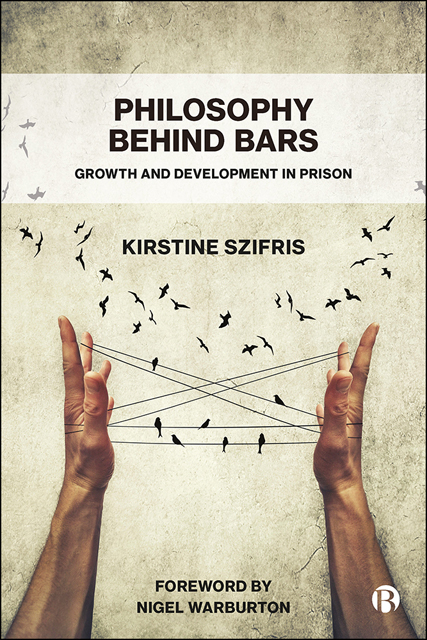Book contents
- Frontmatter
- Dedication
- Contents
- List of Boxes
- Acknowledgements
- Foreword
- 1 Philosophy, Identity and the ‘Ship of Theseus’
- 2 Towards Theory: People, Places and Voices
- 3 Survival, Plato and the Ideal Society
- 4 Kant, Bentham and the Question of Identity
- 5 ‘Why Do You Think That?’ Descartes, Hume and Knowledge>
- 6 Not Just an Offender, But a Person
- 7 Trying to Find a Community of Philosophical Inquiry
- 8 Finding Trust and Developing Relationships
- 9 Personal Self-Exploration
- 10 Towards a Framework for Understanding Philosophy in Prison
- 11 Final Reflections
- Appendix: Technical Methods
- Bibliography
- Index
9 - Personal Self-Exploration
Published online by Cambridge University Press: 15 April 2023
- Frontmatter
- Dedication
- Contents
- List of Boxes
- Acknowledgements
- Foreword
- 1 Philosophy, Identity and the ‘Ship of Theseus’
- 2 Towards Theory: People, Places and Voices
- 3 Survival, Plato and the Ideal Society
- 4 Kant, Bentham and the Question of Identity
- 5 ‘Why Do You Think That?’ Descartes, Hume and Knowledge>
- 6 Not Just an Offender, But a Person
- 7 Trying to Find a Community of Philosophical Inquiry
- 8 Finding Trust and Developing Relationships
- 9 Personal Self-Exploration
- 10 Towards a Framework for Understanding Philosophy in Prison
- 11 Final Reflections
- Appendix: Technical Methods
- Bibliography
- Index
Summary
‘Seriously, from … Monday night, there was anticipation of the class. Tuesday morning, up until 12 o’clock, you were outside the prison, because you were doing something that was … it's very, very seldom that you get time to be able to think on a higher level, if that makes sense.’ (Keith, Full Sutton, VPU)
In each of the four groups, at least one member of the group found Stoicism appealing. Those who did would align themselves with Stoic philosophy, claiming that this was how they had managed themselves during their sentence. One participant went as far as saying that “Stoics will be the happiest people you meet” (Peter, Full Sutton, mainstream).
However, many took issue with the perspective, noting, in particular, that the philosophy seemed quite cold. One person said, “Is it not a good thing to cry behind my cell door?” (Paul, Full Sutton, VPU), with another saying that, prior to coming to Grendon, he would never cry “in front of me missus” (Charlie). Having spent time in Grendon, he now would.
The Stoics perspective provided opportunities to discuss some important aspects of expressing emotions while in prison. In several of the discussions, we examined the difference between suppressing emotions and controlling them, and the difference between acceptance and resignation.
Fundamentally, however, Stoicism offers a perspective on ‘the good life’, a philosophical way of living a meaningful life. Participants reflected on what it meant to live ‘the good life’, considering what it means to live a simple, quiet existence. They argued that life is complex and multilayered, and different approaches can be appropriate for different situations. Some claimed this would be useful in prisons, while others felt that Stoicism would only be relevant to people who already lived that way (but perhaps it might offer a philosophical framework to express their way of living).
In discussing Stoicism with fellow prison-based philosophy teachers, we often note the relevance of this particular perspective for people in prison. Stoical thinking could be particularly useful for people who are facing long prison stretches. Crewe et al's (2020) research into life in prison suggests that prisoners who are some years into their sentences have resigned themselves to the situation and have found ways to accept the frustrations and limitations of prison life.
- Type
- Chapter
- Information
- Philosophy behind BarsGrowth and Development in Prison, pp. 161 - 182Publisher: Bristol University PressPrint publication year: 2021



